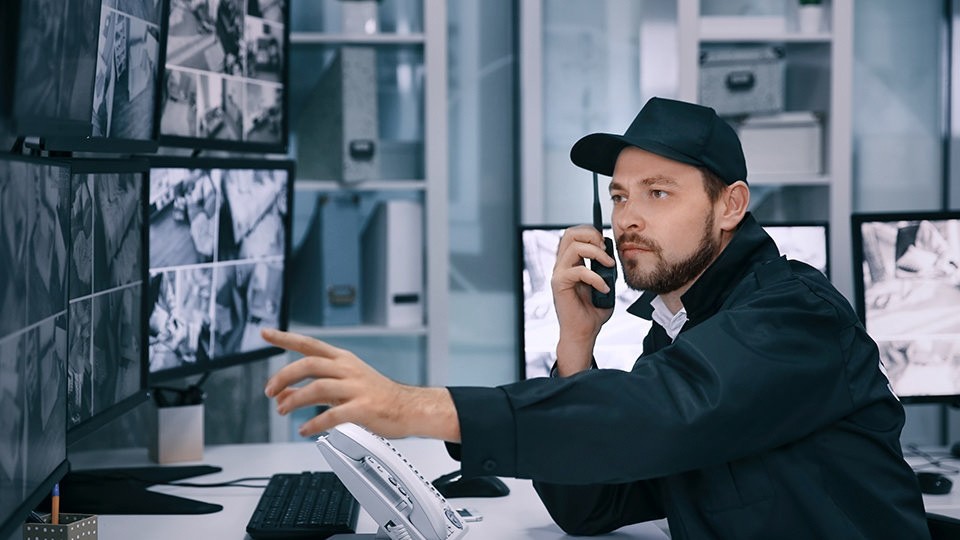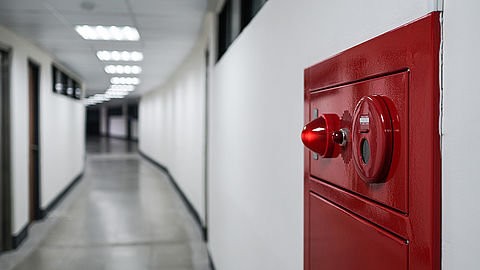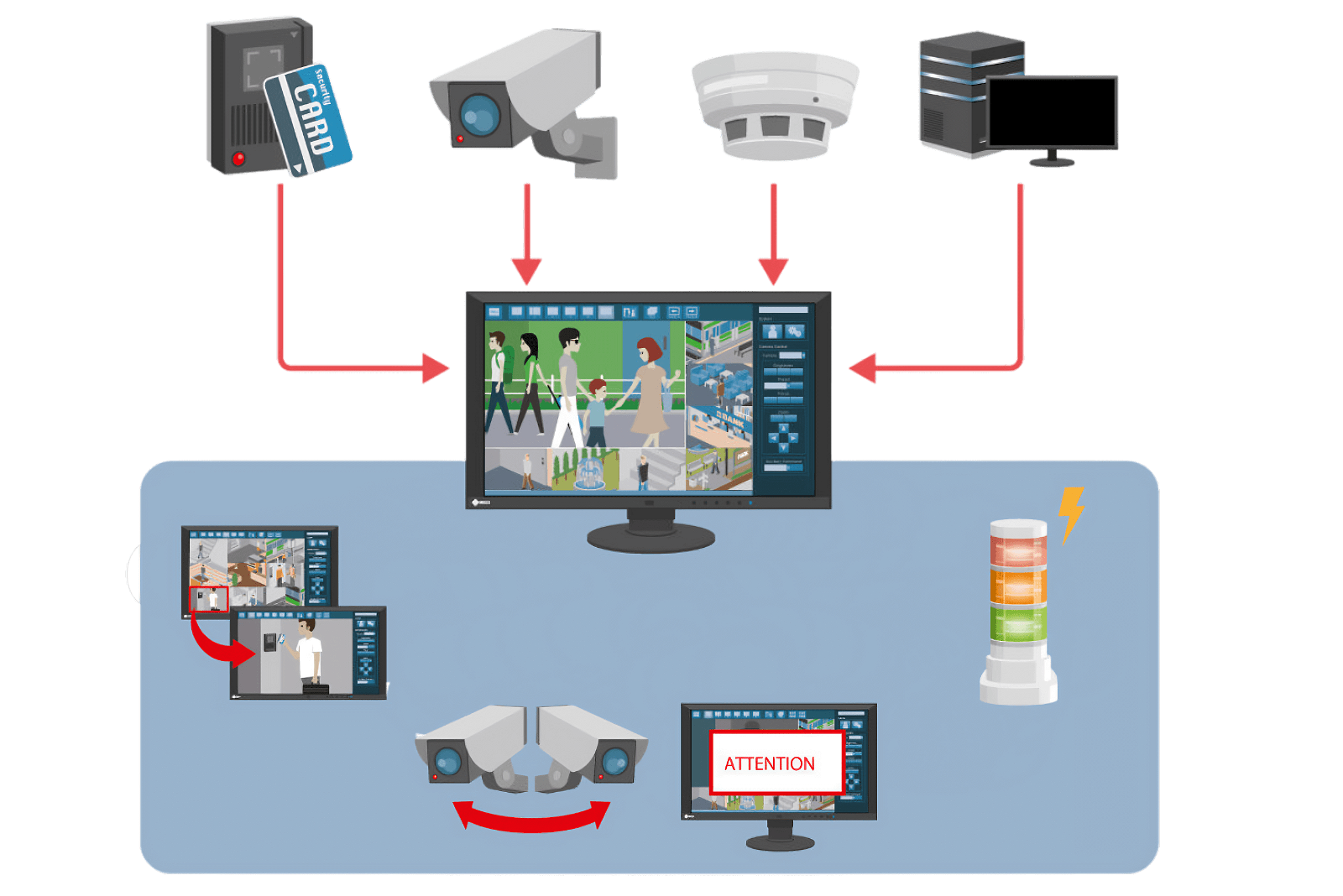Alert-to-Action
Security solution for hospitals
Streamlining event response: Alert-to-action security solution for hospitals
Due to surges in demand for care associated with COVID-19 cases, under available hospital capacities has become a major challenge to healthcare systems worldwide. Increased bed occupancy rates and demand for facility access and diagnostics has put a strain on hospital resources and staffing and highlights a need for advanced, integrated solutions to alleviate growing pressures experienced by medical staff. An efficiently running facility relies heavily on nursing staff and security personnel having the right information at the right time so they can respond to critical situations quickly.
Supporting nurse staff for the optimal care of patients
Event response during high occupancy
Nurse staff are a crucial component to providing optimal care to inpatients and provide several key functions – in addition to monitoring inpatients, they are responsible for supporting visitor inquiries, managing patient data and records, preparation of medication, and other tasks. High occupancy rates and the resulting strains on staff furthers the need for effective real-time notifications that qualify the need for clinical attention and allow nurses to respond to critical events quickly.

EIZO’s IP video decoding solutions support customisable integration with security, life-safety, and access control systems with its Alert-to-Action function.
This means that the monitor itself can serve as a two-way communication device and provide alert notifications directly to nurses in response to specific events. For example, motion sensors or heat-sensing cameras can detect movement from a fall-risk or bed-restricted patient by sending an alert to the monitor over the network.
The monitor can be programmed to automatically adjust its layout, enlarge the screen, or apply visual indicators such as a text message or coloured frame, in response to this alert to actively notify nurses that attention is needed. Even with a centrally positioned nurse station, it is not always possible to maintain visibility of every patient room using just the eyes. A proactive alert solution gets the most important information into the nurse’s hands during critical moments to better support their patient care workflow.
The solution can also help to provide quicker assistance to patients prone to wandering, or patients who require of close monitoring, such as those in the ICU.
Maintaining a safe environment 24/7
People flow management
Hospitals are required to be accessible to the public, and as a result, unknown visitors can enter the premises at almost any time. With high volumes of people accessing medical facilities daily, real-time notifications are needed to better facilitate incident investigation, prevent unauthorised access to sensitive areas, and respond quickly to emergencies.

When integrated with the local access control system, EIZO’s IP decoding solutions can take a more proactive role in protecting hospital grounds.
With the Alert-to-Action function, the monitor can provide visual indicators if an unauthorised person enters a sensitive area such as a quarantined or sterile area, if door or window locks have been tampered with, or if unknown or suspicious persons have accessed the facilities or exhibited odd behaviour. Specific examples include when someone enters an area that requires a badge swipe or access code, access credentials can automatically appear on screen, or when a surveillance camera detects tail-gaiting, the monitor can automatically change the layout or add a visual indicator to the screen.
Preventing unnecessary patient risk and hospital losses
Prompt alerts during an emergency
Fire alarms and smoke detectors sometimes go off unintentionally due to exposure to aerosols, steam, dust, or accidental operation. False alarms in a hospital cause deep disruption in patient service and must be urgently verified following hospital protocol before risking patient safety with unnecessary evacuation. Furthermore, fire and rescue crews en route to respond to the emergency can be promptly notified, saving valuable time and resources.

Integrating smoke detectors or fire alarms into the visual communication framework allows for quick and reliable verification of hazardous situations.
When an emergency alarm is activated, an alert can be sent to EIZO’s IP monitor or box solution from the detector that was triggered. A message or other visual indicator can be set to appear on the screen instantaneously so personnel can quickly investigate the location of the potential hazard. If the alarm was determined to have falsely been triggered patients do not need to be put at risk due to unnecessary relocation, and the hospital does not suffer lost staff hours caused by evacuation. Furthermore, fire and rescue crews en route to respond to the emergency can be promptly notified, saving valuable time and resources.
Solution: Alert-to-action
Customisable event response
EIZO’s IP decoding solutions’ web API supports custom integration with the local security systems and devices to allow communication with and response to alerts over the network. When an event occurs and an alert is sent from IP cameras, access control, hazard detection, VMS, or other systems, EIZO’s solution responds with a preassigned action, such as layout adjustment, message display, audio activation, camera adjustment, masking, and more. Implementing an intelligent visual communication system into the workflow is a step forward in alleviating some of the pressures caused by a fast-paced, information-heavy environment for nurses, security personnel, and other hospital staff – the ultimate goal of which is to ensure optimal patient care and maintain safe premises.
Individual solutions
We know that the security and surveillance sector has very varied and specific requirements
